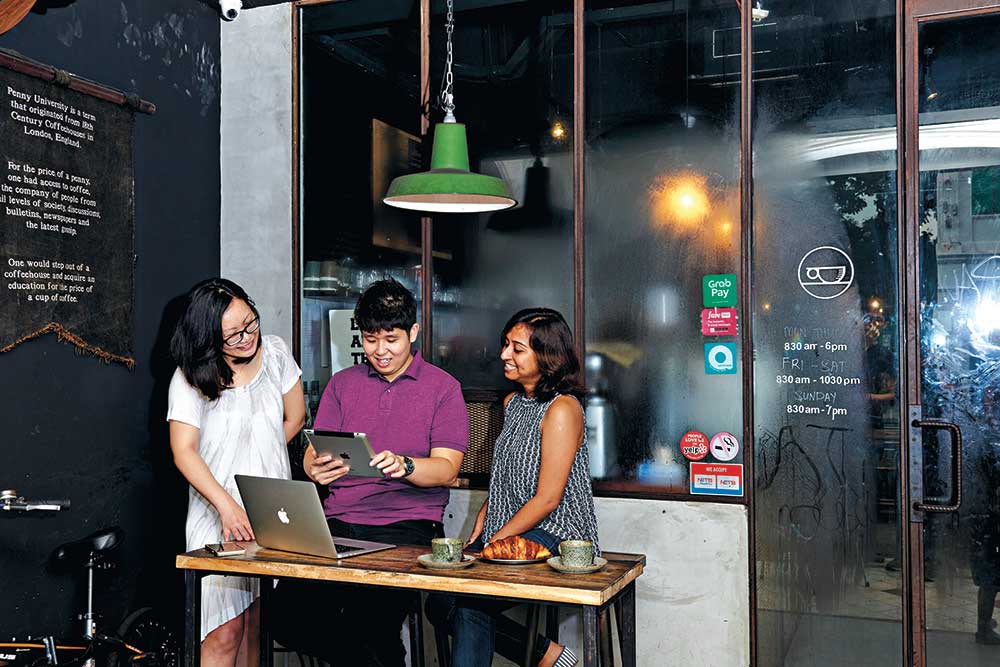Caught Up in a (Social) Media Frenzy?
As one of the most wired countries on the planet, Singapore not surprisingly has a tremendously high rate of social media penetration. But for all the opportunities that it opens up for communication, interaction and branding, social media does have its negative aspects. Can a balance be struck between the good and the bad? Our alumni weigh in.
OUR PANEL

Ms Hwee Ang
(Architecture '01)
39, Works in the venture capital sector

Ms Priya Prasad
(Arts and Social Sciences '08)
32, Head of Department at a secondary school

Mr Chua Ming Howe
(Computer Science '14)
29, Executive Manager (IT), Agri-Food & Veterinary Authority of Singapore
What social media platforms are you on, and how much time do you spend on them?
Hwee: I was previously on Facebook but have deactivated my account. I am now only on LinkedIn, and only log in for perhaps five minutes per day. I use it specifically for business development purposes – it has been quite helpful in my career and I have managed to revive some old work contacts since returning to the (venture capital field) after a three-year hiatus.
Ming Howe: I am on Facebook and Instagram. I’m also on LinkedIn but I don’t use it as a social media platform. I probably spend about two hours each day checking Facebook and Instagram, largely to ‘stalk’ my friends and follow up on news that might interest me. I do get articles from news sites such as ST Online that are pushed to me through Facebook, which I find is a good way to catch up on trending topics.
Priya: I also spend about two hours on social media platforms each day, be it to update my school’s Facebook account, or watch nail art videos on Instagram (laughs)! I also catch up with my ex-students through Instagram, which is their preferred platform – Facebook is out of fashion with the younger generation.
Do you post often on these platforms, and if so, about what?
Hwee: I repost content selectively; largely articles that resonate with me, such as those on topics of technology and investments.
Ming Howe: As compared to Instagram which I share with closer friends, my network on Facebook is a lot wider, and would include colleagues and bosses. So, I would say that I have a different persona for each platform: on Instagram I might share my travel experiences or things that are meaningful to me, but I hardly post on Facebook as I am more wary of how my posts are being perceived. Similarly, because of my own user behaviour, I do not take my friends’ posts as a reflection of their life.
Hwee: Social media posts are really just curated snapshots of a person’s life or thoughts at a moment in time. It’s largely stage-managed, I feel.
Priya: Actually, I don’t think most regular people would go to such an extent as to carefully create an online persona. That is more true for those who take social media postings as their profession – such as an Instagram model.
Hwee: It also has to do with what the individual uses the medium for. Those who use it as a means to communicate with a private community would generally post content that inspires conversation among the group. Those who use it more to promote themselves would have more curated public profiles that showcase a certain side of themselves or their life, which fits the image that they wish to perpetuate.
Priya: Well, for the kids there is nothing private about social media; it is all public – they bask in the attention. It is certainly a very effective platform for getting heard.
Ming Howe: Indeed. To give an example, when a Twitter user wrote a post about the difficulties in getting a license (from the AVA), it was immediately flagged and our IT team went on to study the issue of online applications. More and more organisations – from companies in the private sector to government agencies – are taking steps to engage people through social platforms.
Hwee: Also, it isn’t just teenagers who market themselves through social media. Many people use LinkedIn as a platform for professional self-promotion but sometimes put out content that are not intellectually rigorous. But one could still get a lot of “likes” depending on his or her popularity.
Do you find it an effective platform for gathering information?
Priya: As an alternative to mainstream media, social media does give users a means of finding out different ways of thinking about things. But you have to look at the information objectively.
Ming Howe: The algorithm behind the sites and apps is such that the platform feeds you the type of content that you like to consume. So what you get out of it really depends on your own user behaviour.
Hwee: I do get updated on trending topics through LinkedIn, but I also realise that what I get is a self-selecting outcome. In the very least it provides me with conversation-starters among industry people.
Ming Howe: Personally, I don’t think social media platforms are meant for intellectual discourse.
Hwee: A platform’s purpose has to do with how its users perceive it. I think many people see social media simply as a place to freely voice their opinion, often in real time — and sometimes without much thought.
Ming Howe: Yes, this is most apparent with issues that might be somewhat controversial – that is when you start seeing the extremes in opinion being put out on social media.

Would you say social media is divisive, then?
Ming Howe: Well, there are people who use social media to connect to a community, and there are those who really just use it to make abrasive comments and stir tension.
Hwee: Such behaviour is often just a reflection of an individual’s dissatisfaction in life.
Ming Howe: There are also Facebook pages set up just to troll the government. You really have to assess the value of the platform for yourself.
Priya: My students wouldn’t know the difference between informed opinions and fake news that is spread on social media! That said, they don’t use the platforms for news consumption.
Hwee: Such ignorance isn’t unique among the young, but also among some of the less-savvy and the elderly. I personally have relatives who would take what they read on Facebook as gospel truth – for example, they might get very excited about an article on a cure for cancer and start sending it to everybody in the family.
Do you think social media is still effective in its “social” function?
Priya: Actually, I find that many of the 15 to 16 year-olds use social media just to show case what’s happening in their lives. The actual socialising happens a lot on gaming platforms, rather than on social media.
Hwee: I remember being fascinated by the BBS (Bulletin Board System) in my teenage years too! I think social media doesn’t replace socialisation. Also, it has now turned into a branding tool not just for individuals but also corporations, which is why we are constantly bombarded by marketing information pushed to us through these platforms.
On that topic: are you wary of losing proprietary information through the use of social media?
Ming Howe: It is not just social media. The moment you go online, be it to send an email or to surf the internet, you are giving away information about yourself – from your age and gender, likes and dislikes, and even your location. There are many algorithms tracking your user behaviour, and this data could either be used for push marketing or sold to other corporations. It’s just a matter of how much data the telcos and IT companies want to mine.
Hwee: A friend, who in the business of background checks, does not even send out pictures of his children through WhatsApp, because everything that is posted virtually may stay there forever.
Priya: I think the compromise on personal information is dormant knowledge for most people, but I don’t think anybody truly thinks about it or acts on it.
Hwee: I did! That was why I deactivated my Facebook account. We are losing rights to our private information, and putting them in the control of others.
Ming Howe: I would sometimes think about the concerns, but I do also realise that the moment you are online there is no way to control this loss of proprietary information. But this also goes back to why I am more cautious of what I put up on social media: whatever you post could come back to you one day, because these things cannot be erased!
What are the other risks of using social media?
Priya: Cyber-bullying happens everywhere. Also, impressionable youths might be negatively affected when they don’t realise that what they see on social media is not necessarily a reflection of real life. In a 2017 survey conducted by the Royal Society for Public Health in England, Instagram was ranked worst for young people’s mental health. It affects youths more because studies have shown the human brain’s prefrontal cortex only fully develops at around 21 years of age for men and slightly earlier for women. Teenagers do not realise that it is a part of the brain called the amygdala – associated with emotions and impulses – that drives their decisions, and that their reasoning capacity might be limited.
Given the risks, should social media be more regulated?
Priya: There already are age restrictions to setting up accounts on social media, but it is easy to get around them. And with everybody owning a smartphone these days it is hard to regulate usage. Recently, France banned the use of mobile phones in schools to promote actual real-time engagement. But in Singapore, secondary school students are encouraged to bring their phones and announcements are sometimes made through WhatsApp groups. There is a strong push towards adopting technology.
Hwee: The push for adoption of technology can a bit overzealous at times, and seen as a solution to everything.
Ming Howe: If you put in checks – such as having to use your identification number to verify your age and identity in order to set up an account – then it would defeat the whole purpose of having a space that is “free”.
Hwee: Also, technology transcends geographical barriers and the regulations of individual countries, so short of banning it nation-wide – such as in the case of Facebook, YouTube and Google in China – not much can be done. The companies behind the social media platforms certainly won’t want to enforce any such regulations because it would mean losing users and lowering revenues.
What then are the advantages of using social media?
Priya: It is useful for me largely to keep in touch with my ex-students – it is, however, against regulations to connect with current students on social media. For the teaching community, Facebook is also used it to connect, communicate and collaborate – we learn different teaching methods from what each other shares.
Hwee: In some industries, a lot of people still use Facebook as a means to expand their network, perhaps because the company is the poster boy for the prevailing demographic. Facebook also connotes the idea of a fraternity.
Ming Howe: Facebook has managed to evolve so that it has many other functions – such as buying and selling through Marketplace.
What do you think is the future for social media?
Priya: I am not sure. There was a time when there was a Snapchat craze, but that has died down and somehow Facebook, Instagram and Twitter are the ones that have prevailed.
Ming Howe: As seen from the Snapchat example, those with wider functions and are capable of evolving will survive.
Hwee: And higher perceived value. Social media is here to stay because the corporations behind them have developed the businesses beyond what they originally were. However what I do hope to see is greater control in the hands of the users – be it the ability to protect personal data or the ability to retract something posted and have all records of it erased.
If you’d like to join our Forum panel, do write to us at OARconnect@nus.edu.sg to express your interest and pick from our list of future discussion topics that you may want be part of.